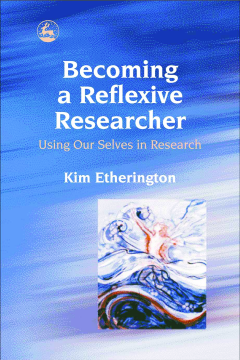
Additional Information
Book Details
Abstract
In this book, Kim Etherington uses a range of narratives to show the reader how reflexive research works in practice, linking this with underpinning philosophies. Placing her own journey as a researcher alongside others, she suggests that recognising the role of self in research can open up opportunities for creative and personal transformations.
Kim Etherington is a Reader at the University of Bristol, and is a BACP accredited counsellor and supervisor in private practice. She has worked as an occupational therapist in NHS general and psychiatric hospitals, social services and charitable organisations, including a child guidance clinic and a community for people with autism. She is the editor of Trauma, the Body and Transformation and author of Narrative Approaches to Working with Adult Male Survivors of Child Sexual Abuse, both published by Jessica Kingsley Publishers.
`She has achieved her aim of the book being readable and giving insight into the processes of doing research through the lenses of the personal stories of researchers, whilst still writing a text that could be used as a core research method text for those who are themselves becoming reflective researchers. No matter what your background in the social sciences this original book, grounded in the reflexive practice of an experienced teacher and researcher, is well worth checking out'.
Escalate
`This is an optimistic book which advocates and describes a different research paradigm to be practiced and developed… Read it and research!'
Lapidus
`Etherington (U, of Bristol) uses several narratives, including her own research diary and conversations with students and academics to demonstrate the way reflective research works in practice. Illustrating her points with poetry, paintings, metaphors and dreams, she suggests that recognizing the role of self in research can open up opportunities for creative and personal transformations. She also explores the use of reflexivity in counseling and psychotherapy practice and research'.
Book News
Table of Contents
| Section Title | Page | Action | Price |
|---|---|---|---|
| Becoming a Reflexive Researcher:\rUsing Our Selves in Research | 3 | ||
| Contents | 7 | ||
| Preface: In the Beginning is My Ending… | 9 | ||
| Part 1:\rBringing Theories Alive | 13 | ||
| 1.\rIntroduction | 15 | ||
| 2. Reflexivity: Meanings and Other Matters | 25 | ||
| 3.\rEverything but the Kitchen Sink | 38 | ||
| 4.\rRe-telling Stories of ‘Everything\rbut the Kitchen Sink’ | 54 | ||
| 5.\rMethodologies and Methods | 71 | ||
| Endnote to Part 1\rBeware | 86 | ||
| Part 2:\rThe Masters Stage of the Journey | 87 | ||
| 6. A Personal Journey: My Masters Stage | 91 | ||
| 7.\rThe Supervisor’s Role in Reflexive\rResearch at the Masters Stage | 99 | ||
| 8.\rHeuristic Inquiry as a Vehicle\rfor Growth and Development | 109 | ||
| 9.\rKeeping a Reflexive\rResearch Journal | 127 | ||
| 10.\rAutoethnography | 137 | ||
| 11.\rUsing Creativity\rin Autoethnography | 150 | ||
| Endnote to Part 2:\rTalking to the world\r(from Mel’s conversation with me) | 159 | ||
| Part 3:\rThe Doctoral Stages | 161 | ||
| 12.\rThe PhD Student–Supervisor\rRelationship | 165 | ||
| 13.\rConnecting Doctoral\rResearch Topics to Ourselves | 179 | ||
| 14.\rStories of Liberation\rand Independence | 195 | ||
| 15.\rToo Close To Home:\rA Dilemma of Involvement | 202 | ||
| 16.\rReflexive Embodied Research | 212 | ||
| 17.\rEthical Relationships\rin Reflexive Research | 226 | ||
| Part 4:\rThe Postdoctoral Stages | 233 | ||
| 18.\rBeing a Reflexive\rPostdoctoral Researcher | 237 | ||
| Endnote to Part 4:\rA Dream | 259 | ||
| References | 263 | ||
| Subject Index | 275 | ||
| Author Index | 281 |
